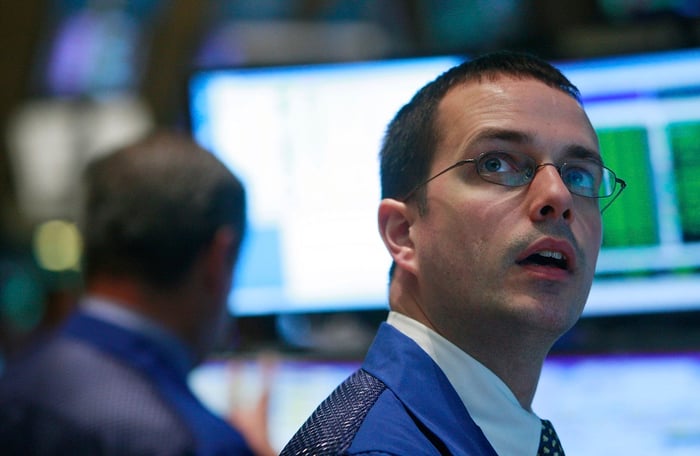|
|
|

|
|||||

|
|
For the better part of the previous 30 months, the bulls have ruled the roost on Wall Street. Prior to the recent correction, we witnessed the ageless Dow Jones Industrial Average, benchmark S&P 500, and growth-propelled Nasdaq Composite all achieve record-closing highs.
While these gains have been primarily attributed to the rise of artificial intelligence (AI), there's no denying that stock-split euphoria played a key role in lifting the valuations of foundational companies last year.

Image source: Getty Images.
A stock split is a tool public companies have available that allows them to cosmetically alter their share price and outstanding share count by the same factor. The "cosmetic" aspect of these adjustments means a company's market cap and underlying operating performance aren't impacted by a split.
Though stock splits can occur in either direction, most investors gravitate to companies conducting forward splits -- i.e., those designed to reduce a company's share price to make it more nominally affordable for investors without access to fractional-share purchases through their broker.
But while stock-split euphoria was all the rage in 2024, initial public offering (IPO) mania looks to be taking center stage this year.
In 2024, more than a dozen high-profile companies completed a stock split, and all but one was of the forward variety. Many of these were from industry-leading businesses, some of which are found in the AI arena.
For instance, graphics processing unit (GPU) goliath Nvidia (NASDAQ: NVDA), AI-networking solutions colossus Broadcom (NASDAQ: AVGO), customizable rack server and storage solutions specialist Super Micro Computer, and semiconductor wafer fabrication equipment company Lam Research all completed respective 10-for-1 forward splits between June and October.
Nvidia and Broadcom are two of less than a dozen public companies to have ever reached a nominal trillion-dollar market cap, and are, arguably, the two most-important names in the evolution of artificial intelligence. Nvidia's Hopper (H100) and successor Blackwell GPU architecture hold a near-monopoly on AI-accelerated data center market share.
Meanwhile, Broadcom's hardware is being counted on to connect up to 32,000 GPUs at once in order to maximize computing speed and minimize tail latency. AI software and systems require split-second decision-making, which Broadcom is helping to facilitate.
We also witnessed some of Wall Street's most-prominent consumer-facing businesses take the stock-split plunge in 2024. Walmart kicked things off with a 3-for-1 forward split, which was followed up not long thereafter by fast-casual restaurant chain Chipotle Mexican Grill completing its first-ever split -- and one of the largest in the New York Stock Exchange's history -- at 50-for-1.
Despite retail investors rallying around stock-split stocks in 2024, no prominent stock splits were announced during the first quarter. The recent correction for the S&P 500 and Nasdaq Composite, coupled with the underperformance of the "Magnificent Seven," relative to the broad-market indexes, may be playing a role in tempering stock split expectations.

Image source: Getty Images.
But amid the chaos of the last six weeks on Wall Street, a new phenomenon has emerged: IPO mania.
On Friday, March 28, AI-data center infrastructure company CoreWeave (NASDAQ: CRWV) debuted at $40 per share. While this was, technically, below the range the company had been seeking, and shares of the company languished during its first two days of trading, CoreWeave stock rocketed higher by 42% on April 1 to close at $52.57 per share, giving it a nearly $25 billion valuation.
CoreWeave is backed by Nvidia and expected to play a key role in advancing the AI revolution. It acquired 250,000 Hopper chips from Nvidia with the hope of becoming a leading AI-GPU cloud center for businesses seeking compute power. If PwC's forecast of AI adding $15.7 trillion to the global economy by 2030 is even remotely in the ballpark, companies like CoreWeave can play a key role in the expansion of this game-changing technology.
But the IPO that's really turned heads is conservative media stock Newsmax (NYSE: NMAX). Newsmax raised $75 million by pricing its stock at $10 per share on Monday, March 31. When the closing bell rang on Monday, Newsmax shares were at $83.51. A day later (April 1), they peaked at $265 on an intra-day basis and closed at $233, equating to a market cap of close to $21 billion.
Newsmax is most likely receiving a retail investor-driven boost from a same group of individuals who bid up Trump Media & Technology Group prior to Donald Trump winning the presidency in November.
While it's always exciting to see investors rally around high-growth and/or brand-name businesses becoming public entities, there's a reasonably high probability that the good times won't last.
For instance, there's no denying that CoreWeave is growing like a weed. It recorded $1.92 billion in sales last year after generating just $228.9 million in revenue in 2023. But it's had to spend aggressively and rely on debt financing to fuel this growth. Interest expenses alone outpaced its operating income in 2024, with the company ultimately reporting an $863.4 million net loss.
There's also concern that Nvidia's GPU upgrade cycle -- Nvidia is attempting to bring next-gen GPUs to market on an annual basis -- could quickly depreciate CoreWeave's Hopper chips in its AI-accelerated data centers and/or reduce interest in demand from businesses seeking compute power.
The other glaring problem for CoreWeave is that no game-changing innovation has escaped an early innings bubble-bursting event in more than 30 years. Investors frequently overestimate the utility and/or adoption rate of Wall Street's hottest trend, which eventually leads to disappointment. Companies with lofty valuation premiums tend to be among the hardest hit.
The run-up in Newsmax is, arguably, even more egregious.
Based on the company's latest annual filing, sales rose by 26% in 2024 to $171 million. Though traditional ad revenue only increased by 1%, the bulk of the gains came from digital subscriptions and a 1,006% increase in affiliate fees. As with CoreWeave, there's no arguing that the revenue needle is pointing in the right direction.
On the other hand, general and administrative expenses jumped to $153.9 million last year from $100.9 million in 2023, which resulted in Newsmax's net loss ballooning to $72.1 million. Newsmax hasn't yet demonstrated that it can generate a profit (let alone a recurring profit), and it's trading at (drum roll) 122 times trailing-12-month sales. No company, let alone a media stock, has been able to sustain a price-to-sales multiple of anywhere close to 122 over the long run.
Though it's anyone's guess how long IPO mania will hog the spotlight, historical data strongly suggests neither CoreWeave nor Newsmax will sustain their current hype or valuations.
Ever feel like you missed the boat in buying the most successful stocks? Then you’ll want to hear this.
On rare occasions, our expert team of analysts issues a “Double Down” stock recommendation for companies that they think are about to pop. If you’re worried you’ve already missed your chance to invest, now is the best time to buy before it’s too late. And the numbers speak for themselves:
Right now, we’re issuing “Double Down” alerts for three incredible companies, and there may not be another chance like this anytime soon.
*Stock Advisor returns as of April 1, 2025
Sean Williams has no position in any of the stocks mentioned. The Motley Fool has positions in and recommends Chipotle Mexican Grill, Lam Research, Nvidia, and Walmart. The Motley Fool recommends Broadcom and recommends the following options: short March 2025 $58 calls on Chipotle Mexican Grill. The Motley Fool has a disclosure policy.
| 7 min | |
| 17 min | |
| 21 min | |
| 21 min | |
| 30 min | |
| 30 min | |
| 31 min | |
| 34 min | |
| 34 min | |
| 38 min |
Nvidia Hits Buy Trigger With Earnings Due, Tech Show Ahead. Is Nvidia A Buy Now?
NVDA
Investor's Business Daily
|
| 40 min | |
| 42 min | |
| 50 min | |
| 51 min | |
| 56 min |
Join thousands of traders who make more informed decisions with our premium features. Real-time quotes, advanced visualizations, backtesting, and much more.
Learn more about FINVIZ*Elite